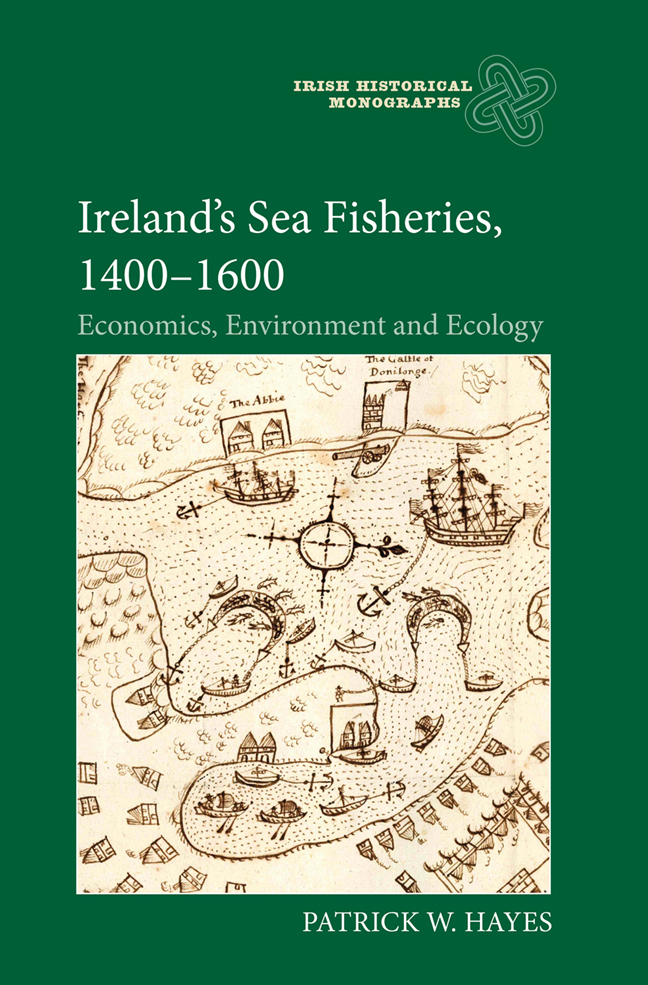Book contents
- Frontmatter
- Dedication
- Contents
- List of Illustrations
- Acknowledgements
- Abbreviations
- Glossary of Fish Species
- Introduction
- 1 The Development of Fisheries, 1400–1500
- 2 Diversity and Cooperation in Sixteenth-Century Fisheries
- 3 The Fish Trade
- 4 The Impact of War and Piracy
- 5 Fish Consumption and Provisioning
- 6 Oceanographic Variation and Environmental Change
- Conclusion
- Appendices
- Bibliography
- Index
- Miscellaneous Endmatter
- Frontmatter
- Dedication
- Contents
- List of Illustrations
- Acknowledgements
- Abbreviations
- Glossary of Fish Species
- Introduction
- 1 The Development of Fisheries, 1400–1500
- 2 Diversity and Cooperation in Sixteenth-Century Fisheries
- 3 The Fish Trade
- 4 The Impact of War and Piracy
- 5 Fish Consumption and Provisioning
- 6 Oceanographic Variation and Environmental Change
- Conclusion
- Appendices
- Bibliography
- Index
- Miscellaneous Endmatter
Summary
Their fishful bays, were taken from the Irish of the province of Ulster, and given in their presence to foreign tribes.
Annals of the Four Masters, Volume Six, 1608, discussing the Flight of the EarlsThis quotation encapsulates the profound changes the seventeenth century brought to the fisheries of Ulster and Ireland as a whole. But without the context of the previous two centuries, we could not possibly understand why it was significant that these fisheries were ‘taken from the Irish’. It is to be hoped that this book has provided that background and shown that fisheries were one of the most important and most productive industries in fifteenth- and sixteenth-century Ireland. Nor is the growth, decline and dispossession of the fisheries an obscure historical curiosity, only of interest to the specialist; these changes were fundamental elements of Ireland's economic, environmental, and cultural history.
Earlier I quoted Tim O’Neill as saying that the arrival of herring shoals and the subsequent herring fisheries was the ‘greatest single economic event’ of the fifteenth century. Others have made similar claims without substantiation or explanation. In some ways, O’Neill was correct; the growth of fisheries in the fifteenth and sixteenth centuries was highly significant to the development of the Irish economy, but until now the scale and reasons for this growth have not been explored in detail.
In reality, it was not just one factor, such as the ‘arrival’ of herring shoals, that led to the growth of fisheries in the fifteenth century. Rather, it was a confluence of events that created conditions ripe for fisheries to prosper. Raymond Gillespie has written that regarding the economy as ‘socially embedded relationships, rather than mechanistic markets for exchange’ can allow us to ‘bridge cultural worlds and use economic life as an organising principle for describing early modern Ireland’. The same can also apply to fisheries. We have considered the more mechanistic elements of the fish trade, including export volumes and prices, and these are valuable data points for understanding just how much fish was extracted from the ocean. But ultimately, the most important characteristic of fisheries during the period was the relationships built between landowners, fishers, and merchants from across different communities in Ireland and Europe. These facilitated and strengthened fisheries and propelled them to prosperity. The breakdown of these relationships seriously harmed the industry in the later sixteenth century.
- Type
- Chapter
- Information
- Ireland's Sea Fisheries, 1400-1600Economics, Environment and Ecology, pp. 248 - 254Publisher: Boydell & BrewerPrint publication year: 2023



